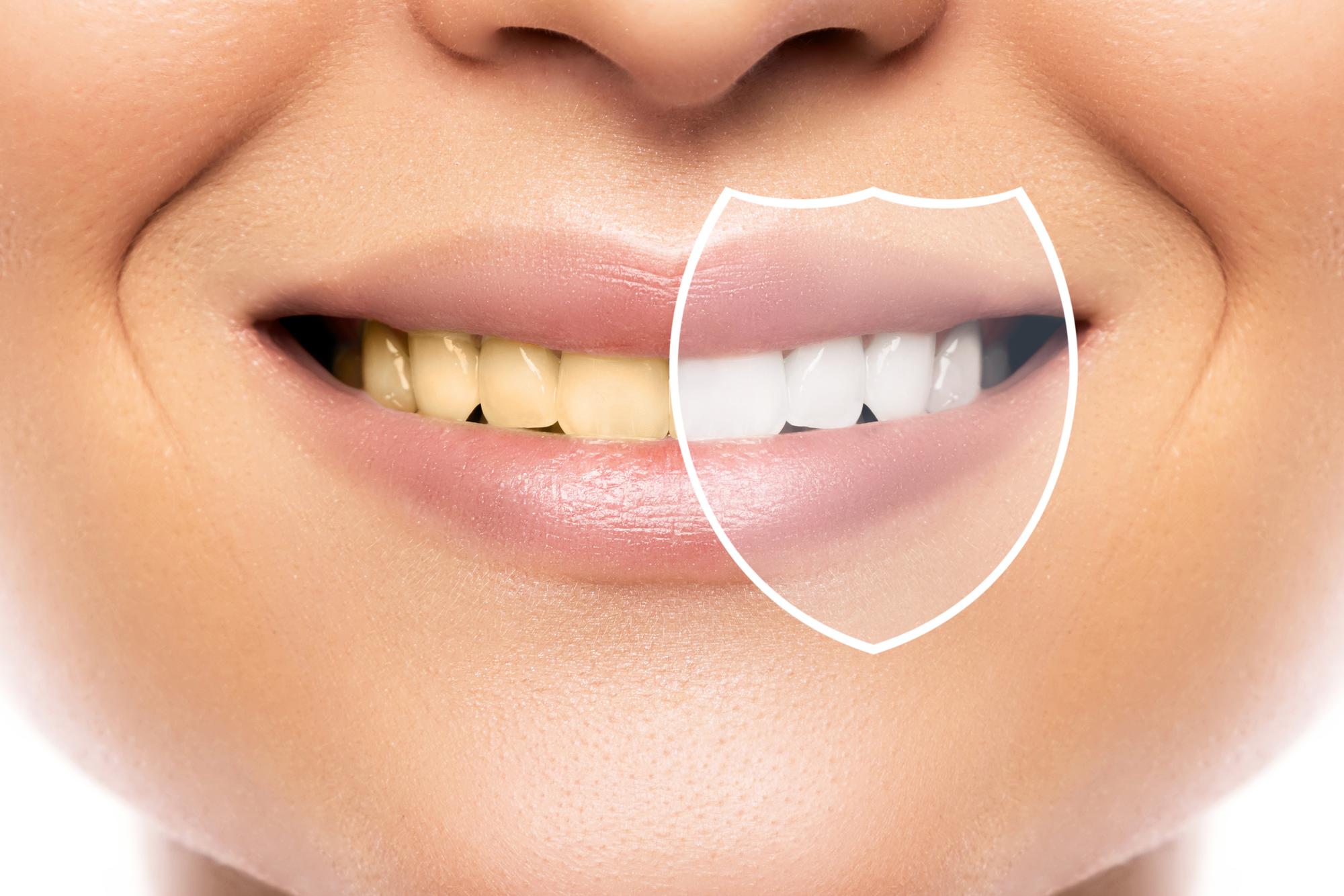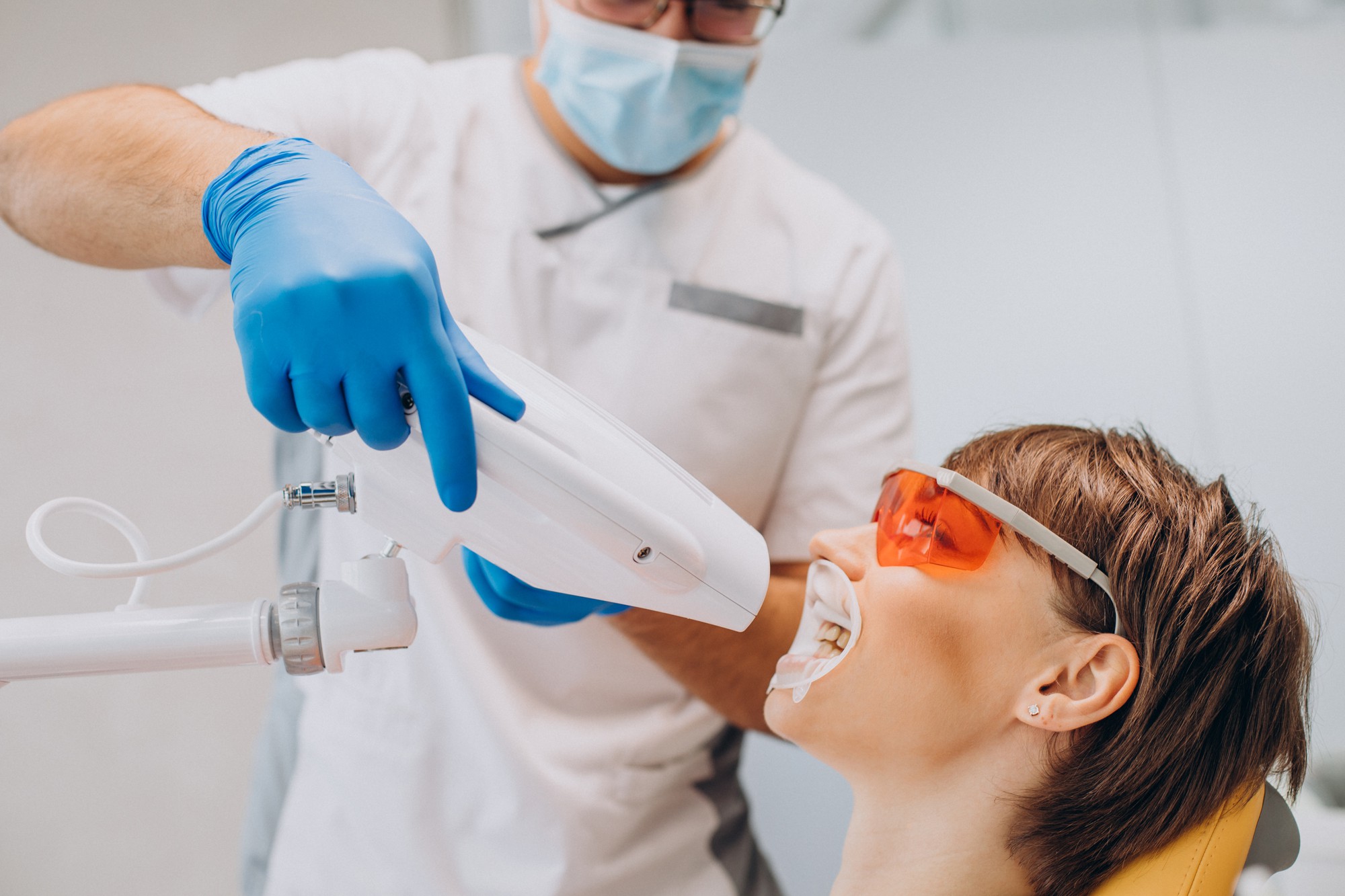Bleaching with laser
The longevity of laser teeth whitening:
No whitening treatment lasts forever, and to prevent your teeth from changing color quickly, you must regularly clean them. Your food choices and lifestyle are the main reasons for the discoloration of your teeth in the first place. If you don’t address the causes of tooth discoloration, you cannot expect the results of your whitening treatment to last long.
You should take care of your teeth after laser whitening to help maintain the results as long as possible. Try the following actions:
Quit smoking or reduce its consumption. Regular contact between your teeth and tobacco can cause your smile to become yellow and dirty.
Laser teeth whitening steps:
All professional whitening treatments essentially work the same way, as they all rely on some high-strength whitening agents (usually carbamide peroxide and hydrogen peroxide). The steps of laser teeth whitening are performed in the dentist’s office and include a few simple steps:
First, your dentist will place a plastic or rubber mouthguard to keep your mouth open. Then, a protective layer is placed on your gums to shield them from the whitening gel and prevent gum irritation and burning. Once the protective layer is in place, the dentist carefully applies the whitening gel to your teeth.
Next, a pen-like laser is used to activate the applied gel. The laser light causes the gel to foam, which means it is activated to remove stains from your teeth.
The gel remains on your teeth for a few minutes. The dentist will then remove it with a small suction device. The dentist will repeat these steps two or three more times until your teeth reach the desired color.

Necessary steps for laser teeth whitening in the office and using whitening materials at home:
- Teeth cleaning (scaling)
- Taking impressions of both jaws to create a custom whitening tray for home use
- Laser teeth whitening session
- Providing the patient with whitening materials for continued treatment at home
Benefits of laser teeth whitening:
Time-saving: One of the main advantages is the time-saving factor, as noticeable results can be achieved in a single laser whitening session.
Which teeth are not suitable for whitening?
- Whitening is only effective on natural teeth.
- Artificial teeth, crowns, bridges, and fillings do not respond to this process. Sometimes, these items can be replaced after treatment to match your brighter smile.
What happens if teeth are over-whitened?
- Over-whitening with bleaching agents can lead to tooth erosion. If your teeth are exposed to whitening agents too much, the enamel that protects your teeth may wear away. This can lead to long-term oral health problems such as decay, tooth fractures, and cause significant pain.
- Placing whitening materials inside a custom tray and leaving it in the mouth for 3 hours (home whitening method after in-office treatment).
The custom tray is designed for the patient to continue the whitening process at home after the in-office treatment.

Side Effects of Laser Teeth Whitening
Laser teeth whitening is a safe and effective method. However, it can cause some minor and short-term side effects, including tooth sensitivity during the days following the procedure. You may also experience some discomfort or temporary irritation in your teeth. Another possible side effect is that your gums may become slightly sensitive. Following and adhering to the dentist’s recommendations after the whitening procedure will help minimize these side effects.
These side effects rarely worsen, but in some people, they may become more severe. It is very important to avoid consuming anything too hot or cold for a few days after the laser whitening to prevent these side effects.
Tooth Damage
Teeth grinding can gradually erode tooth enamel, weakening the teeth against food. People who suffer from bruxism (teeth grinding) may face issues with tooth decay and damage if they don’t take steps to address the problem.
Our Services for Patients at the Clinic
FAQ
What services are offered at Dr. Hamed Keramat's Specialized Dental Clinic?
Could you provide the clinic's address and how to get there?
How can I know the exact cost of dental services before treatment?
What are the working hours of Dr. Hamed Keramat Specialized clinic?
Dr. Hamed Keramat specialized clinic is open on Saturdays, Sundays, Mondays, and Wednesdays in the afternoon shift, and on Tuesdays and Sundays in the morning shift to serve you, our esteemed patients.
How can I book an appointment at Dr. Hamed Keramat specialized clinic?
To book an appointment at Dr. Hamed Keramat specialized clinic, simply call 88694120 or fill out the contact form on Dr. Keramat’s clinic website, and our experts will get in touch with you as soon as possible.
